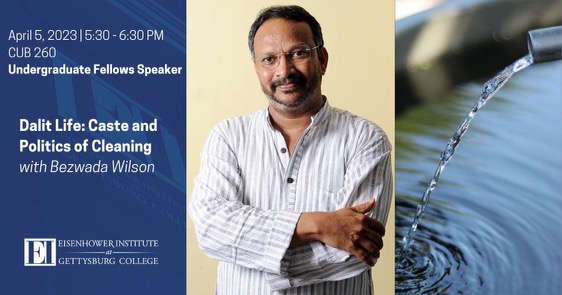Indian Activist Bezwada Wilson Visits Gettysburg College
By Kenzie Smith, Staff Writer
On Wednesday, the Eisenhower Institute hosted Indian activist Bezwada Wilson for a lecture entitled “Dalit Life: Caste and Politics of Cleaning.” Wilson has been campaigning to eradicate the manual scavenging that Dalits, the lowest class in India, are forced to do.
The lecture began with an introduction by Undergraduate Fellow Carter Hanson ’23.
Wilson expressed the gratitude he felt being able to discuss these issues with students at Gettysburg College.
“This is really [an] honor to me to be here with you on the discussing about the plight and the struggles of the manual scavenging community and the Dalits, particularly in India,” Wilson said.
To start the discussion, Wilson explained the caste system that is in place in India. In this system, there are four categories, but he said there is a fifth category of people: the “untouchables.”
“There is a fifth category which is not part of that [system]. So they were completely out of the society, out of the villages where we live, and our interactions with the untouchables are limited,” Wilson said. “We have to put an end to this kind of a system.”
Wilson said that while India is a democracy, it does not practice what he sees as the basics of democracy.
“Democracy means equality, liberty, fraternity, justice. These are the basic[s], so when we ignore these basic things, but we call ourselves . . . a democratic society,” Wilson said.
Wilson was born into the “untouchable” society. Untouchables are assigned duties such as collecting human excrement and carrying and dumping the waste. Wilson explained his experience as a child, when he was made fun of at school and people looked at him in a way that he described as damaging his dignity.
“Any poet or any literary people even cannot write that pain,” Wilson said.
Wilson started questioning why the system operated the way it did. Initially, he was told to just accept it and move on. Wilson said that he could not let it go, so between the ages of 14 and 15, Wilson started his journey of advocacy. His initial questions of why the Dalits had to do this work turned into an anger towards the system.
“And then I had [saw] the women [are] collecting the fecal matter. That was a horrible, and it was a very inhuman, and it is such a terrible thing which I cannot digest in my life. Even now, if the scene comes to my mind that [disturbs] me a lot,” Wilson said, “How really cruel we [humans] are. We can make a human being come and clean our shit.”
Wilson explained that this advocacy journey has been a long and difficult one, especially at the beginning when those who tried to speak out were punished.
“They have given them such a treatment so nobody can voice out for at least fifty years,” Wilson said. “They are sent to the jail. They are, most of them, are suspended, they are taken out of the village, they are socially boycotted.”
Even after speaking out, Wilson struggled with trying to create open discussions of these issues. He wanted to take this advocacy further and reach the government.
In 1993, the Indian Parliament created a law making manual scavenging of human excrement an illegal occupation. When Wilson and his colleagues went to evaluate the law and effects of it in 2003, no one accepted their documented cases of the continued occurrences of manual scavenging.
“No District Collector filed a case. No minister asks about this. No prime minister [took] this into the parliament,” Wilson said.
The group was finally able to reach the Supreme Court, but another hindrance arose when they tried to collect data. The Indian states denied having people employed to perform manual scavenging labor. Anytime Wilson submitted photo evidence of the toilets that the manual scavengers cleaned, the toilets would be destroyed.
Wilson also went to collect data on the deaths of manual scavengers caused by the sewer systems and septic tanks. However, the government did not have this data.
“Even the government. They don’t consider our life as an equal to the life of other citizens. ” Wilson said. “Every data is there, but when there is a how many manual scavengers [died], no data.”
The lack of data caused Wilson and his colleagues to start collecting data themselves, which is still an ongoing process. They have found that on average, there are between 200 to 300 people that die every year from manual scavenging.
Although Wilson described the fight as long and filled with many difficulties, he said he still has hope for the future of the movement. He believes the next generation will not tolerate this system.
“I’m so optimistic,” Wilson said, “The next generation will not tolerate [it]. There is no doubt, they will not tolerate [it]. They want to be free like everybody.”
The lecture concluded with questions from the audience, moderated by Undergraduate Fellow George Malian ’23.
Following the event, Hanson said, “It’s nice to hear about labor movements, not just in the US,” Hanson said, “It’s nice to hear a kind of hopeful or more optimistic story in India.”

